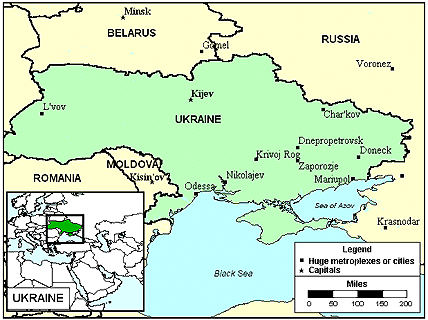|
|
Prayer Profile
The Azerbaijani of Ukraine
![[IMAGE]](../images1/0165.jpg) While the origins of the Azerbaijani, (also known as the Azeri), are unclear, we do know that they have been subjected to numerous invasions throughout their history. They were first conquered by the Persians in the sixth century B.C. Islam was introduced into the area during the seventh century A.D., and has been practiced there ever since.
While the origins of the Azerbaijani, (also known as the Azeri), are unclear, we do know that they have been subjected to numerous invasions throughout their history. They were first conquered by the Persians in the sixth century B.C. Islam was introduced into the area during the seventh century A.D., and has been practiced there ever since.
By the eleventh century, Persian influence was overpowered by Turkic influence. Eventually, during the thirteenth century, this region of Asia fell while under the dominion of Genghis Khan.
These numerous invasions, combined with the tribal nature of the people, caused the Azeri to spread throughout Central Asia. Significant Azeri communities can be found in Russia, Ukraine, Iran, and Iraq. Today, nearly 37,000 Azeri live in the Ukraine. Some are farmers, while many others have moved into the cities to work in industry. They often have low skill jobs under "foreign" managers.
What are their lives like?
In the past, the clan-type family structure was common among the Azeri. The clan, or hoj, was usually named after a common ancestor. Clan members shared pasture land and were bound to provide mutual aid to each other. They frequently acted as a unified entity in business dealings. It was also common for up to forty members of an extended family to live together in large dwellings called gazma. Landless peasants, called tavyrga, made up the lowest social class of Azeri.
In a desire to protect their culture, marriage within the family was encouraged. Unions between first cousins were considered the most desirable. Marriage to a non-Azeri was almost unheard of prior to the Soviet period. Polygyny (having more than one wife) was only allowed in cases of infertility.
The Azeri diet consists mainly of rice pilaf and a variety of grilled and boiled meats including beef, goat, and lamb. Traditional dishes include bozartma (mutton stew), dovga (a soup made from yogurt), meat, and herbs. Tea and wine are popular drinks.
The Azeri language belongs to the southwestern (Oguz) branch of the Turkic language family. There are two main subgroups of Azeri: Azerbaijani North and Azerbaijani South. The main differences are in the sounds and basic grammatical structure of the languages. Azeri has a written tradition that dates back to the fourteenth century. Arabic script is used in Iran and the Cyrillic alphabet is used in Azerbaijan. Azeri serves as the somewhat hybrid, yet common, language of eastern Transcaucasus, southern Dagestan, and northwestern Iran.
What are their beliefs?
The Azeri living in the Ukraine are primarily Muslims of the Ithna Ashari tradition, but there are some Hanafite Muslims as well. Twenty percent of the Azeri in the Ukraine do not practice any form of religion.
Traditionally, Islam among the Azeri is a reflection of the historical ties that exist between Azerbaijan and Iran. Until the twentieth century, most Azeri identified themselves as Muslims rather than Azerbaijani or Turks. They believe that being a "spiritual community of Islam" was much more important that being a nation.
Among the Azeri Muslims, religious practices are less restrictive of women's activities than in most of the other Muslim countries. The majority of Azeri women have jobs outside the home, and a few have attained leadership positions. However, some evidence of the traditional, restrictive female role remains.
What are their needs?
While there is more freedom to share the Gospel in the Ukraine than Azerbaijan, the Azeri remain very resistant. Currently, there are two missions agencies targeting them, but their progress has been very slow. The Bible and the Jesus film are available in their language; however, there are still no known believers among them. Christian radio and television broadcasts as well as literature are needed to successfully reach them with the Gospel.
Prayer Points
- Ask the Lord to send long-term Christian workers to the Ukraine to share Christ with the Azeri.
- Pray for God to bring vision for outreach to Ukrainian believers who are currently living among the Azeri.
- Ask God to send prayer teams who will break up the soil through worship and intercession.
- Pray that God will open doors for Christian businessmen to share Christ with the Azeri.
- Ask the Holy Spirit to soften their hearts towards Christians so that they will be receptive to the Gospel.
- Pray for God to give wisdom, favor, and strategies to the missions agencies that are targeting the Azeri.
- Ask the Lord to raise up strong local churches among the Azeri.

See also the Azerbaijani of:
Kygerzstan,
Russia,
Turkey,
Turkmenistan,
Uzbekistan,
Armenia,
Azerbaijan,
Georgia,
and
Iraq.
Statistics
Latest estimates from the World Evangelization Research Center.
THE PEOPLE
- People name: Azerbaijani
- Country: Ukraine
- Their language: Azeri
- Population:
- Largest religion:
- Christians: None
- Church members: None
- Scriptures in their own language: Bible
- Jesus Film in their own language: Available
- Christian broadcasts in their own language: None
- Mission agencies working among this people: 2
- Persons who have heard the Gospel: 10,300 (28%)
- Persons who have never heard the Gospel: 26,600 (72%)
THEIR COUNTRY
- Country: Ukraine
- Population:
- Major peoples in size order:
- Major religions:
- Number of denominations: 29
© Copyright 1997
Bethany World Prayer Center
This profile may be copied and distributed without obtaining permission
as long as it is not altered, bound, published
or used for profit purposes.
![[HOME BUTTON]](../graphics/home.jpg)
![[CALENDAR BUTTON]](../graphics/calico.jpg)
![[LIST BUTTON]](../graphics/listico.jpg)
[Home]
[Calendar]
[Country List]
|